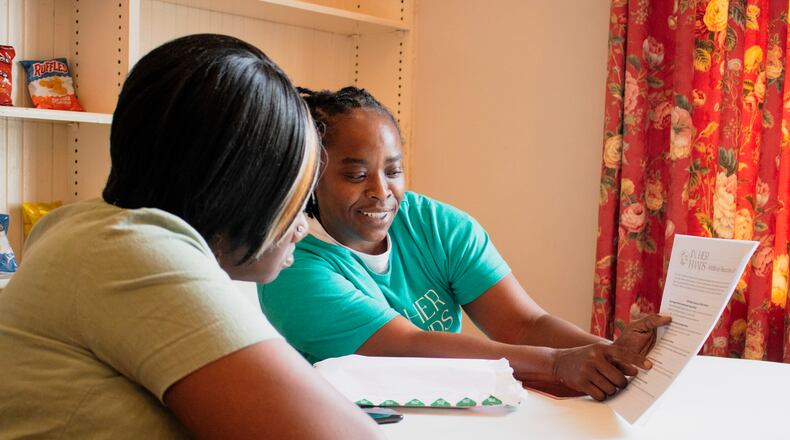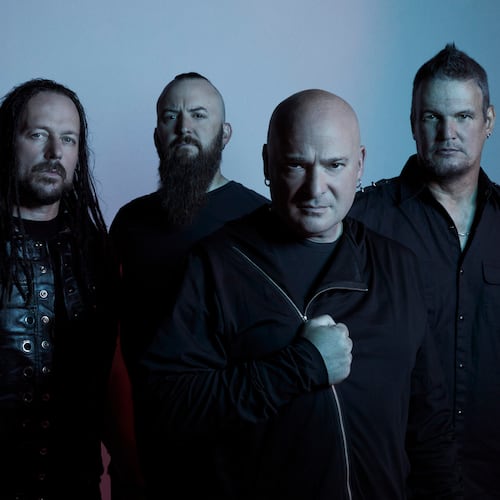Ana Greene moved to Atlanta from New York five years ago to boost her career and find love.
She got a job in ocean imports and logistics that allowed her to use her degree in marine transportation from State University of New York Maritime College. She also met a man and they later moved in together.
But a high-risk pregnancy during the pandemic left her unable to work. She lost her job. Then her partner lost his job.
Greene felt as if everything was falling apart all at once.
In October 2022, she got a lifeline. She was accepted into a program, one of about 40 pilot studies operating in cities nationwide, that provides guaranteed income and is designed to address economic disparities in historically marginalized communities.
“Without it, I don’t know how I would have been able to survive and provide my kids with the things they needed and create an atmosphere they needed to be happy and healthy,” said Greene, 31, who is now a mother of two.
Launched in 2022, “In Her Hands”, a partnership between Georgia Resilience and Opportunity Fund and GiveDirectly, provides an average monthly income floor of $850 to 654 women in three communities across Georgia: Old Fourth Ward, College Park and Clay-Randolph-Terrell counties. Women who meet income and geographic eligibility requirements are selected by lottery.
Half of the participants receive $850 per month for 24 months and the other half received $4,300 in the first month to catch up on expenses and $700 per month for 23 subsequent months.
The cash transfers are unconditional and in the first year of the program, recipients reported using the funds to catch up or get ahead on bills (45.4%), to reduce debt (26.9%) or to purchase essential items (25.3%). Some participants have requested financial training and plans are in place to incorporate these topics as women exit the program.
For residents like Greene, who aren’t destitute, who have family to assist and who have the capacity to work, finding resources when they are needed can feel like an impossible task, she said.
Americans hold firm to the belief that if you work hard and follow the rules, you will always come out on top, but too many Georgians have learned this isn’t always the case. Programs that offer an alternative to traditional public assistance show some promise in helping those in need of temporary assistance.
Research from the first 12 months of In Her Hands indicated that participants experienced fewer missed house payments and fewer utility shut offs in a six-month period than nonparticipants. Program participants were also less likely than nonparticipants to end up in questionable financial situations such as pay day loans, pawn shops, selling blood plasma or over drafting their checking accounts.
Almost 30% of program participants were able to begin building their savings and they were 60% more likely than nonparticipants to be enrolled in higher education.
When Greene applied for the cash transfers, she felt as if she had run out of other options. Rent for the one-bedroom apartment she had been living in since 2018 had jumped from $900 to $1,400 and she couldn’t keep up. With no job and no unemployment, she filed for bankruptcy. She had planned to save the money from In Her Hands to return to school and eventually launch a business, but she ended up using the lump sum of $4,300 to pay the rent she owed.
There were many programs to help Georgia’s poor but Greene often did not qualify, she said.
She was declined for Section 8 housing but when she turned to shelters after her daughter was born, workers told her a recovering mom and newborn were a liability. She struggled to get SNAP benefits and health insurance. Churches where she sought assistance only offered her prayer, she said.
She grew tired of hearing that her situation was not dire enough.
“I have to legitimately be on the street and have no means of being anywhere and no means of making money. There is no way for me to say I need temporary assistance. I would have to be on my last dime to get some of these services,” Greene said.
Each month, when they would be down to nothing, the check from In Her Hands would come in.
“It was the only thing that kept us going,” she said. “We have never had a month where we could put that money to the side once we got it.”
Initially, she used the $700 per month for diapers, personal care and clothing for her son, but when her daughter was born, the apartment would not renew her lease given her previous payment history, so the family had to relocate to a hotel. She now uses the money from In Her Hands to pay for the room.
But this is Greene’s last year receiving assistance from In Her Hands.
Her partner has found a good paying job and helps with expenses, she said. Greene has held temporary jobs that disappear as quickly as they come but with two young children at home and no money for childcare, she is looking for employment that allows her to work remotely. She recently got a lead on a sales job, she said.
She wants to start saving the money from In her Hands so she won’t end up back at square one when the payments end this fall.
“I have to make decisions that are best not just for myself but for my kids,” Greene said. “I can’t do the same things I have done before In Her Hands.”
Read more on the Real Life blog (www.ajc.com/opinion/real-life-blog/) and find Nedra on Facebook (www.facebook.com/AJCRealLifeColumn) and Twitter (@nrhoneajc) or email her at nedra.rhone@ajc.com.
About the Author
Keep Reading
The Latest
Featured




